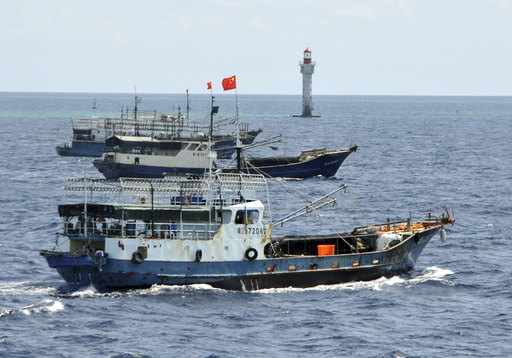A report released on Monday reveals that numerous Chinese distant-water fishing boats reportedly employed North Korean crews from 2019 to 2024, violating United Nations prohibitions. The documented findings suggest that many crew members faced significant maltreatment, including being confined at sea for extended periods.
The Environmental Justice Foundation (EJF), an organization based in London focusing on environmental and human rights issues, found that North Koreans were working on at least 12 Chinese tuna long-liners operating within the southwest Indian Ocean. This information was primarily gathered through interviews conducted with 19 Filipino and Indonesian workers, who shared their experiences while aboard these vessels.
According to the report, “The accounts shared by the Indonesian and Filipino crew members indicate that deliberate measures were taken to obscure the presence of North Koreans on these fishing vessels. Those North Korean sailors appeared to be compelled to labor for as long as 10 years without returning to land at times.” The report further emphasized that such conditions exemplify forced labor that exceeds much of the abuse typically witnessed in the global fishing industry.
The study claims that the North Korean workers were shifted between different vessels through a process known as “trans-shipment,” which hindered their ability to return to land. Unnamed crew members from Asia suggested that their North Korean counterparts were prohibited from using mobile phones or disembarking their ships during harbor stays.
EJF noted that it could not determine the exact number of North Koreans onboard these Chinese fishing vessels, as crew members were frequently transferred to sister ships. Utilizing North Korean labor is a violation of a 2017 U.N. Security Council resolution that instructed member states to refrain from granting work permits to North Koreans and mandated the repatriation of remaining crews by the end of 2019. This decision was made following North Korea’s tests of long-range missiles that contravened other U.N. Security Council resolutions.
Additionally, the use of North Korean laborers on these vessels appears to circumvent regulatory frameworks established by the U.S. and the European Union aimed at excluding goods produced by North Korean workers from their markets. Alongside Russia, China is believed to inadequately enforce U.N. sanctions against North Korea and has consistently vetoed U.S.-driven initiatives to impose stricter measures, even in light of North Korea’s banned weapon tests.
As of now, there has been no immediate response from the Chinese Foreign Ministry regarding these claims. Prior to the 2019 U.N. deadline, it is estimated that many thousands of North Koreans were working overseas primarily in factories, restaurants in China, and various labor sites in Russia to generate essential foreign currency. The EJF indicates that this is the first time North Korean labor has been publicly acknowledged aboard distant-water fishing ships.
Generally, North Korean workers abroad have been subjected to constant monitoring by the regime’s security agents, working more than 12 hours daily, and receiving only a small portion of their wages, with the majority funneled back to their government, as reported by defectors and experts. Despite the U.N. restrictions, South Korean authorities and analysts suspect that a considerable number of North Korean workers continue to participate in economic activities globally, sending funds that may contribute to the country’s nuclear programs.


